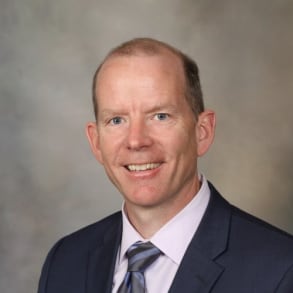The Rochester Gastroenterology and Hepatology Division succeeds through clinician-led innovation — recognizing gaps and finding solutions. Division leaders invest in the team, seeking opportunities to challenge that status quo, train the next generation of clinicians and build on a legacy of success.
Yeah. When we look at change in medicine, we realize we can let it change around us and then we react to it where we can lead that change. So we've been encouraged by our current leadership to be comfortable taking risk. We have clinician led innovation that every single person is recognizing the gaps that exist in our field. So one of the things that sets G. I apart from other specialties is the procedures that we do and we have teams of people that are leading the development of new devices, new technologies and new ways to apply old technology to bring new solutions to patients. So one of the exciting things that we're pursuing currently is this idea of endoscopic innovation. Were internally we kind of mimic what the surgeons do with bariatric surgery that is less invasive and less expensive than surgery. It's critical to collaborate with colleagues around the world through something we call our E board. So if we see a difficult case that we're not sure what the right answer is or what the next step is, we will bring it to this keyboard. And what we've learned is these patients their cases. We've changed management courses and it's really changed outcomes for these patients. Were able to maintain the ranking for example in U. S. News and World Report because we're not satisfied and we're not content with the status quo. I see the opportunity for G. I. Is to continue training the future of Gi. We recruit residents into our Gi fellowship program that allows us to select the best residents from across the world. Were also very willing to commit resources. So when a new area develops in GI, we have someone here who has that expertise. Do you come out of your GI training, having been taught by key thought leaders in every single subspecialty of gastroenterology, and then while they're here, we develop their skills and endoscopy, patient care research. And if we can always invest in our teams will continue to be successful. My aspiration is to build on the legacy that leadership teams before us have developed and through that, use it as a foundation to transform medicine from within.


